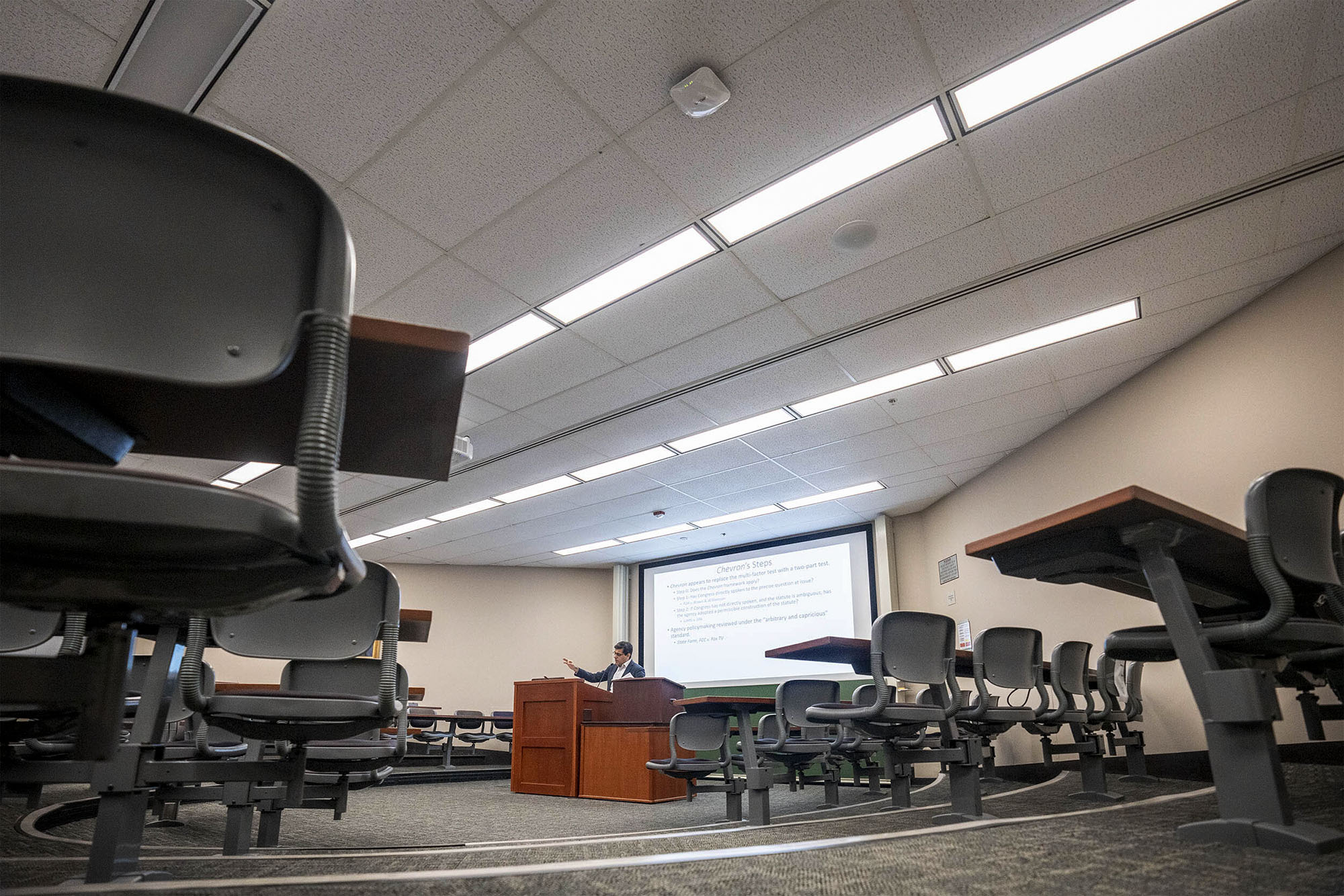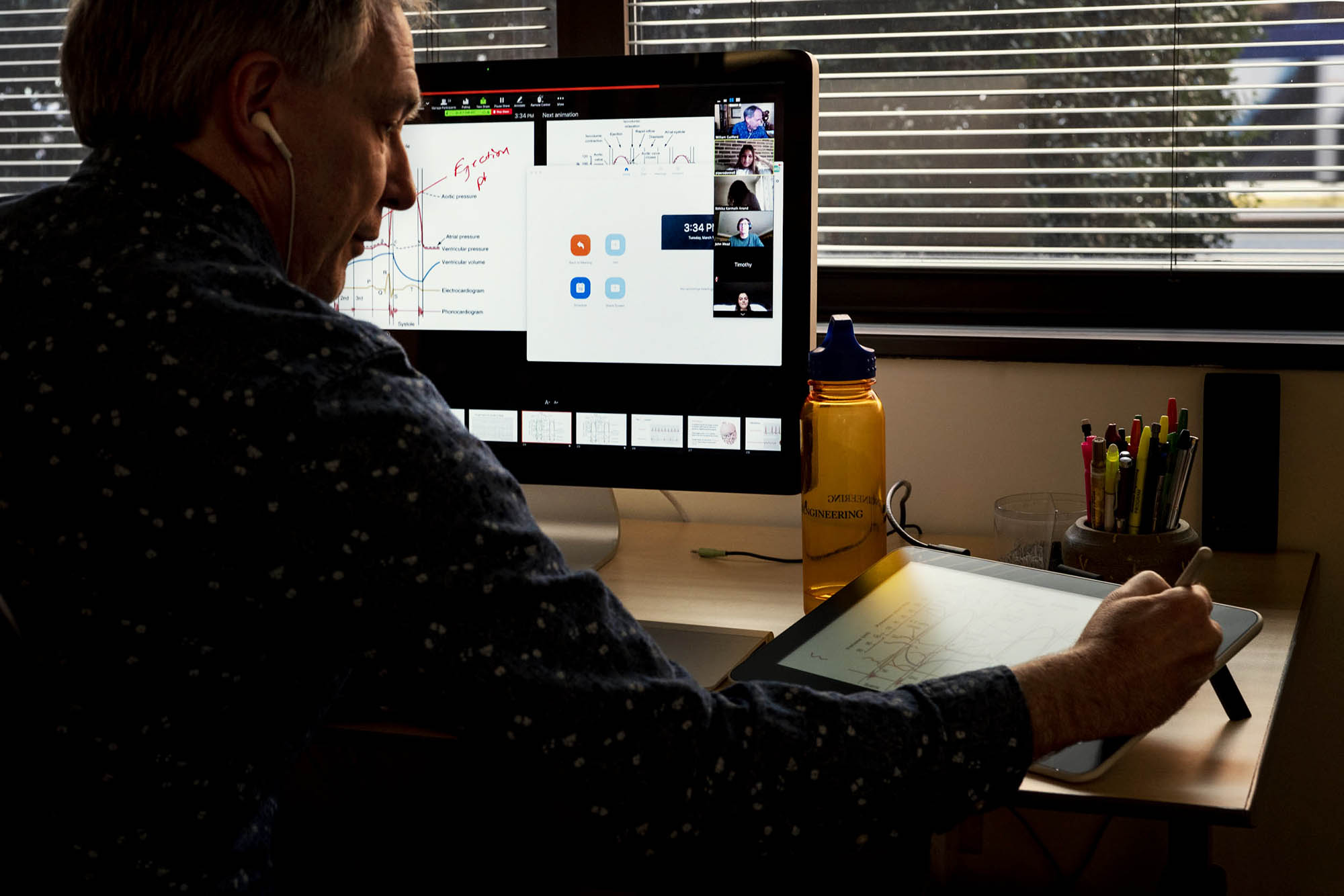Courses began this week in a virtual setting for University of Virginia undergraduates – an approach adopted for the first two weeks of the fall semester as UVA leaders continue to evaluate the way ahead.
A mix of online and in-person courses could begin next month, and the University said it will announce by Friday if plans for students to return to Grounds are changed. Whatever the approach, UVA faculty and academic leaders know that most undergraduate courses will be online this fall.
The Center for Teaching Excellence and Learning Design & Technology in the College of Arts & Sciences have invested considerable time and resources this summer to ensure the highest-quality learning experiences possible under the circumstances.
“This summer the University invested in and deployed a number of faculty professional development opportunities to support the design and creation of our best possible online classes,” Vice Provost for Academic Affairs Archie Holmes wrote in email. “The response from our faculty has been incredibly strong and overwhelmingly positive.”
“We have been working with instructors to ensure that this fall’s courses will be both supportive and challenging, in keeping with the value and quality UVA is committed to delivering to all of our students,” Holmes said.

The professional development programs ranged from facilitated workshops, some of which lasted for several weeks; to one-on-one consultations with faculty; to self-guided resources grounded in evidence-based practices for teaching and learning. In addition to helping instructors design online courses, these workshops and online resources have presented new learning technologies to make it easier for faculty and students to have engaging discussions and both peer-to-peer and peer-to-instructor contact in an online environment.
Michael Palmer, who directs the Center for Teaching Excellence, said that designing an online course from scratch is different from moving existing classes online, which UVA had to do in March as the coronavirus pandemic hit the U.S. in the midst of the 2020 spring semester.
The provost’s office supported the initial collaborative development of the University’s “Teaching Continuity” website that was first dedicated to making that transition and still functions. After a busy summer, instructors have many more resources to work with in conducting their online courses for the fall semester. The newest hub for connecting to the best options of learning technologies is Learning Tech.
The majority of instructors working with the Center for Teaching Excellence staff and others over the summer were planning for online instruction, either synchronous, asynchronous or a combination, Palmer wrote in email. (A synchronous course is scheduled live at a specific time whereas asynchronous activities are made available for students to complete on their own time without live guidance from an instructor.)
“We have been working hard to create a robust learning technology ecosystem,” Palmer said. That work entailed further developing resources for existing tools and bringing more than a half-dozen new tools into the online environment. “These new tools help instructors interact and engage with students, assess their learning and allow students to better interact with each other,” he said.

The majority of instructors have planned for online instruction, either synchronous, asynchronous or a combination, especially large lecture courses. (Photo by Sanjay Suchak, University Communications)
One of the center’s latest offerings is a learning-focused course design method called c3Design, which guides instructors through an iterative, dynamic and scholarly process that can be applied to almost any kind of course, whether online, in-person or hybrid. More than 300 instructors used c3Design this summer to redesign courses or develop new ones, over half of them participating in facilitated groups and the other half asynchronously.
Hundreds of faculty members took more than 30 other workshops on online teaching.
Jazmin Brown-Iannuzzi, an assistant professor in psychology, had never taught a totally online course before, so this is “quite new and different,” she said of teaching “Advanced Research Methods in Social Psychology” online and synchronously to a class capped at 40 students. Taking a course design workshop through the Center for Teaching Excellence was incredibly helpful, she said.
She’ll have students form smaller groups to conduct hands-on research using freely available data sets and by conducting studies using online samples, she said.
“Although this may be many students’ first experience with team science, the online atmosphere is actually quite similar to collaborating with researchers who are at other locations or working with colleagues or companies based in different places,” said Brown-Iannuzzi, who has a courtesy appointment in the Batten School of Leadership and Public Policy. “So students will gain research skills as well as learn how to conduct collaborative research using an online platform – skills which are useful for many situations.”
“I can provide meaningful educational experiences even when we aren’t in the same room.”
Although many faculty members have a lot of experience using technology tools in teaching, others, like Brown-Iannuzzi, have not. The Arts & Sciences Learning Design & Technology team devised another innovative program to help faculty members prepare for online teaching – and it also provided valuable experience to newly minted Ph.D. graduates.
In the Digital Pedagogy Summer Internship program, 21 new Arts & Sciences Ph.D. graduates (and three in biomedical engineering) went through a two-week technology boot camp to learn more about the best principles and practices of online teaching. Learning Design & Technology developed the internship training with partners around Grounds, including Director of Online Learning Programs Kristin Palmer, the Center for Teaching Excellence, the Office of Graduate and Postdoctoral Affairs, the UVA Library, the Scholars’ Lab and the Contemplative Sciences Center.
The interns then worked directly with faculty members or small groups of faculty in specific departments and were able to tailor their assistance to the departments’ and teachers’ needs, according to Judy Giering, who directs the Learning Design & Technology Group.
The program was “hugely popular,” she said, and five of the interns will continue working with her team this semester to help ensure things go smoothly.
“It’s exciting that this program is good experience for these Ph.D.s when they go on the job market,” Giering said.
She added, “I have never seen so many faculty putting so much time into talking about good teaching.”
The latest resource, Learning Tech, contains an innovative, searchable catalog of tools, which provides vital information about their pedagogical purposes, functions, availability and support options. Many tools are accessible directly from the catalog with a single click, while others may be integrated into course sites in UVACollab, Canvas or Blackboard. The Center for Teaching Excellence continues to work on enhancements to Learning Tech in partnership with the Learning Design & Technology Group, UVACollab Applications Group and Information Technology Services.
In addition to online resources, Giering and Palmer said their groups will keep up their work this fall, shifting to one-on-one consultations and fall start-up activities, like new faculty and graduate student orientations.
Media Contact
Article Information
August 25, 2020
/content/faculty-academic-leaders-focus-quality-online-courses

